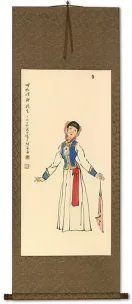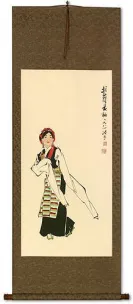Many custom options...
And formats...

Bad Girl in Chinese / Japanese...
Buy a Bad Girl calligraphy wall scroll here!
Personalize your custom “Bad Girl” project by clicking the button next to your favorite “Bad Girl” title below...
Bad Girl
Beautiful Woman
美麗的女人 is the best and most polite way to express “beautiful woman” in Chinese.
Note: Some people may like the simple 2-character 美女 way to express this, but there are some bad connotations with that, so better to stay with this longer and more respectful title.
See Also: Beautiful Girl | Beauty
This in-stock artwork might be what you are looking for, and ships right away...
Gallery Price: $90.00
Your Price: $35.00
Not the results for Bad Girl that you were looking for?
Below are some entries from our dictionary that may match your Bad Girl search...
| Characters If shown, 2nd row is Simp. Chinese |
Pronunciation Romanization |
Simple Dictionary Definition |
不良少女 see styles |
furyoushoujo / furyoshojo ふりょうしょうじょ |
More info & calligraphy: Bad Girl |
鬼娘 see styles |
onimusume おにむすめ |
(1) girl of unsightly and terrifying appearance; girl with bad temper; (2) (See 見世物・1) demon woman (role in misemono) |
The following table may be helpful for those studying Chinese or Japanese...
| Title | Characters | Romaji (Romanized Japanese) | Various forms of Romanized Chinese | |
| Bad Girl | 不良少女 | furyoushoujo furyoshojo | ||
| Beautiful Woman | 美麗的女人 美丽的女人 | měi lì de nǚ rén mei3 li4 de nv3 ren2 mei li de nv ren meilidenvren | mei li te nü jen meilitenüjen |
|
| In some entries above you will see that characters have different versions above and below a line. In these cases, the characters above the line are Traditional Chinese, while the ones below are Simplified Chinese. | ||||
Successful Chinese Character and Japanese Kanji calligraphy searches within the last few hours...











